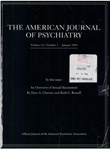Now is the time to retire the term "organic mental disorders"
Abstract
The organic/nonorganic distinction in contemporary classifications of mental disorders such as DSM-III and DSM-III-R has important prognostic and treatment implications, because it directs the clinician to pay special attention to the possibility of an underlying "physical" disorder as the cause of the mental disturbance. However, the term "organic" raises serious and intractable problems, since the connotative meaning of the term always returns to its historical roots, which imply an outmoded functional/structural, psychological/biological, and mind/body dualism. The authors present a proposal being considered for DSM-IV that would eliminate the term "organic" and reorganize the classification of organic mental disorders. Disorders previously referred to as "organic mental disorders" would be renamed as either "secondary disorders" (if they are due to "physical" disorders) or "substance-induced disorders." The entire classification of mental disorders would be reorganized to distribute the secondary and substance-induced disorders into the major groups with which they share phenomenology. The traditional organic mental disorders--delirium, dementia, and amnestic disorder--would be grouped together under the rubric of "cognitive impairment disorders." While acknowledging problems with the suggested new terminology and reorganization of the classification, the authors argue that the potential benefits of the proposal for clarity and for facilitating differential diagnosis justify putting to rest the familiar but now anachronistic term "organic mental disorders."
Access content
To read the fulltext, please use one of the options below to sign in or purchase access.- Personal login
- Institutional Login
- Sign in via OpenAthens
- Register for access
-
Please login/register if you wish to pair your device and check access availability.
Not a subscriber?
PsychiatryOnline subscription options offer access to the DSM-5 library, books, journals, CME, and patient resources. This all-in-one virtual library provides psychiatrists and mental health professionals with key resources for diagnosis, treatment, research, and professional development.
Need more help? PsychiatryOnline Customer Service may be reached by emailing [email protected] or by calling 800-368-5777 (in the U.S.) or 703-907-7322 (outside the U.S.).



